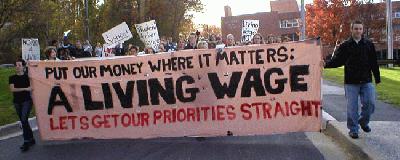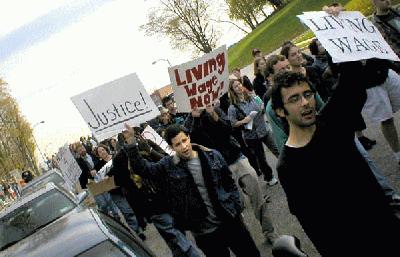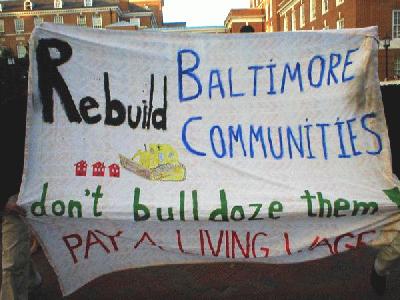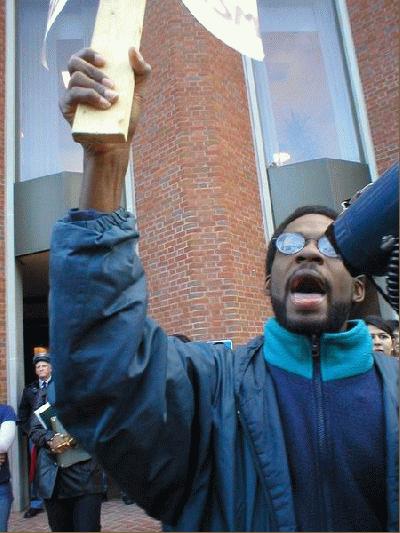Baltimore IMC : http://www.baltimoreimc.org
News :: Labor
A Tale Of Two Campuses: The Struggle For A Living Wage
Students and community members gathered on the grounds of a public university known in Maryland for educating future teachers and on the grounds of the first research university in the United States, the recipient of one of the largest amounts of military research contracts, to protest the lack of a living wage, adequate health care, and workers' rights for contractual services workers on their campuses A report on the protests. (Photos by Neale Stokes)
Within the course of eight days, student-worker alliances held protests for a living wage at both Johns Hopkins and Towson universities. Over 100 students, faculty, staff, and workers gathered at these universities to demand fair pay and decent benefits for all employees--including contracted service workers--at their respective institutions. At Towson University, a list of written demands was delivered to the University administration while at Hopkins the Student-Labor Action Committee again raised the demand for an "indexed living wage" and questioned the development of a Hopkins-based biotechnology park in East Baltimore.
A "living wage" is identified as that wage which brings a family of four above the poverty line. Currently, Baltimore City sets the wage at $8.49 per hour, an amount that is indexed to the cost of living. However, contractual workers on both the Hopkins and Towson campuses do not receive this amount.
The living wage movement, now nation-wide, began in Baltimore in 1994 when BUILD (Baltimore United for Independent Leadership Development) and the public workers union, AFSCME, won a city ordinance requiring companies with service contracts with the city to pay their workers a living wage. According to the Living Wage Resource Center, 95 local governments and three universities have instituted a living wage.
THE PROTEST AT TOWSON UNIVERSITY
"Put Our Money Where It Matters. A Living Wage. Let's Get Our Priorities Straight" stated the banner of the Student Workers Alliance at Towson (SWAT) overlooking York Road in suburban Baltimore County.
Approximately 75 people gathered for a rally organized by SWAT to deliver a list of five demands to the University administration. Paul Parker, Vice-President for Student Affairs and Associate Provost, formally accepted the petition for the Towson University President. Organizers set a deadline of Thursday, November 21 for a written response from the University.
Broad-based support for the student campaign was demonstrated during the rally, where speakers included members of the clergy, tenured and adjunct faculty, a Baltimore immigrant rights lawyer, students, alumni, and Towson clerical workers.
Reference librarian Ada Woods applauded the idealism of the students noting a contrast with many student activists during the anti-Vietnam War movement in which she participated when students had individual interests not to kill and be killed overseas. She said that "even for those who support capitalism, safety nets like the living wage are important." Lutheran campus minister Paul Collinson-String made links to the United States war machine which gets 50% of the U.S.'s discretionary budget. "What is the worth of a civilization," asked Collinson-String. "It is not the military, but how it cares for the most vulnerable of its citizens....In the religious community we believe all are created equal and deserve a living wage."
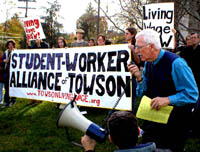
History professor Rod Ryon, a member of Faculty at Towson University for a Living Wage, read from a letter sent by former State Senator Julian Lapides, a 1954 alumnae, to Towson President Jones. Lapides wanted "to go on record as a supporter of the living wage." A younger alumnae Brian Walters, a recent graduate, read the list of demands, printed on a scroll, which SWAT has issued to the Towson University administration. These are:
(1) Towson University must implement a campus-wide living wage (currently $8.49 an hour as determined by the Baltimore City Wage Commission). This wage will apply to ALL University employees, including employees of contractors working for the University. This wage must be indexed to inflation in order to maintain its living wage status over time.
(2) All workers must have access to affordable, complete health coverage for their entire family. If health coverage is not provided by the employer, the employee must receive an increase in pay equal to or greater than the cost of health coverage.
(3) In order to guarantee the right of employees to organize, Towson University must adopt a card-check neutrality agreement, and require all contractors to do the same. Card-check neutrality agreements are two-part pledges taken by employers that honor workers' right to organize unions. First, they mandate that the employer will not launch an anti-union ("union busting") campaign when workers try to organize. Second, they mandate that the employer will recognize the union once a simple majority of workers has signed cards saying that they want to unionize.
(4) The University must strive to create more full time jobs and end its dependence on privatized/outsourced labor, as well as part time/contracted employees.
(5) When the aforementioned demands have been implemented, a committee must immediately be created to monitor the status of Towson's living wage and working conditions on campus. This committee will be recognized by the University and consist of workers, union representatives, SWAT members, administrative officials, and other interested parties. It will follow a structure agreed upon by SWAT, the workers, and the administration. The committee's goal will be to ensure the enactment of all demands and the improvement of working conditions in a complete, and timely manner.
After adminstrator Paul Parker received the demands, the protesters marched down the hill and onto Cross Campus Drive to the University Union under the watchful eyes of a dozen police officers. There the rally continued, but within the earshot of non-protesting students.
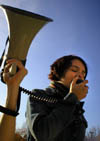
THE PROTEST AT JOHN HOPKINS UNIVERSITY
"Rebuild Baltimore's Communities. Don't Bulldoze Them. Pay A Living Wage" stated the banner of the Student Labor Action Committee which faced towards an enclosed quad on the Homewood campus in Baltimore City's Charles Village. On Thursday, November 7th members of SLAC re-sparked their campaign to get an indexed living wage for contractual service workers at the Johns Hopkins University in a protest which drew about 50.
More than two years ago, in March, Johns Hopkins students locked themselves in Garland Hall in a 17-day protest for a living wage for JHU workers. Then, the student activists won a commitment from Hopkins to implement a living wage for permanent workers and to address the issue of poverty in Baltimore. Students returned to protest many times since because contractual workers still do not receive an "indexed" living wage at Hopkins.
The Hopkins protest last week began with a skit.
NARRATOR: Once upon a time there was a university called Hons Jopkins in a city very far away from here. This university was held together by the hard work of its cafeteria employees, janitors, parking attendants, and other low-wage staff members. One day, one of the workers, Anthony (played by student Susie Schweigert), went to ask the administration for a higher wage.
ANTHONY: Hi, President Grody! I work very hard, 40 hours a week, and I don't make enough to support myself and my family. The cost of living in Multibore is higher than what I make, and even though I work full-time, I still live below the poverty line.
PRESIDENT GRODY: Gosh, that's too bad! Let's consult our alumni association and see if we can do anything about that. Let's consult our anonymous donor!
ANONYMOUS DONOR: [wearing a mask with a big question mark on it] Hey there! What seems to be the problem? Need a new computer lab anywhere? How about a new climbing wall?
ANTHONY: No, actually, I was wondering if I could make a higher wage. It would cost the university less than a lot of the expensive projects it does, and it would make my life, and the lives of my co-workers a lot better.
ANON. DONOR: Hmm. Well, I'm not sure if we can do that for you, but .... President Grody, I don't think you have enough red bricks around here! We all know that students learn better when surrounded by red bricks! Could you use a new walkway or building?
ANTHONY: Um, actually ...
PRES. GRODY: Gee, Mr. Gloomberg, I mean, Mr. Anonymous Donor, I think that's just what this school needs! Hey, and the students have been telling me that the climbing wall in the new AC is awfully short. Oh, and how about another Mattin Center? After all, you can never have too many Mattin Centers.
ANTHONY: Um, well, I think ...
ANON. DONOR: I think that's a swell idea! Let me write you a check! In fact, let me write you several! And here's another big fat check to buy up property in East Multibore so you can build a biotech park!
PRES. GRODY: Thanks, Anonymous donor. And hey, Anthony, thanks a lot for the great suggestions! I would never have thought of more bricks if it weren't for you!
ANON. DONOR: Here, take some complimentary bricks! [throws bricks at Anthony]
PRES. GRODY: Yeah, thanks for your time, and keep up the good work! Oh, and one other thing ... we're going to need you out of your house by 5 today. We're building the biotech park there.
Then, speakers addressed the implications and effects of Johns Hopkins plans to build a biotech park in East Baltimore and the presence on campus of sweatshop-made clothing with SLAC demanding that Hopkins to join the Workers Rights Consortium .
SLAC member Joe Harrow, like the Towson University minister Collinston-String, made links to the military budget in the United States, but with more direct focus on the current situation. Harrow noted that, until recently, the US economy had experienced "unprecedented economic growth." "So then how do we explain that in the year 2000 20% of the children in this country lived under the poverty line, with the poverty rate is still growing, approaching 12%?" Harrow asked.
Harrow went on to link the Bush administration's push for war on Iraq to the Johns Hopkins campus. He decried the fact that the US military budget is "almost half of what the entire world pays on defense." He described Baltimore as a city "plagued by poverty, unemployment, and low wages." Then, he made the connection. "President Brody of Johns Hopkins Institutions is now a special advisor for Bush. It is not surprising that a man who neglects to take care of the workers of his own institution would be favorable in the eyes of the Bush administration. So we don't have to go to DC anymore to be heard. We can be loud here in Baltimore and join the voices of thousands across the country. We can say not in our name, ... not with our money, ... not at the detriment of our communities."
The Hopkins students then marched on the new red bricks, a gift of wealthy donors, to Garland Hall, the University's administration building to further rally. They said they would be back.
Later, Indymedia talked to SLAC activist Maha Jafri.
Jafri said SLAC held this rally "as part of our continuing campaign to institute an indexed living wage, and specifically as a follow-up to a letter we sent to the JHU administration." Jafri was concerned about the current political climate. She thinks "that right now, people in America (and young people, in particular), are hesitant to voice opposition to institutional policies, be they those of the Bush administration, a state government, a university, or any other powerful structure. However, it is exactly during a time like this when dissent is not only valuable, but necessary. Everything we value in this country--democracy, liberty, freedom of speech--did not come to us through a tradition of passive acceptance and resignation to oppressive policy. We should not make the same mistake as the Bush administration, namely, neglecting domestic politics during a time of international conflict. The two are not mutually exclusive."
According to Jafri, SLAC activists are "dissatisfied with distraction from domestic policy and politics in the dubious interest of homeland "security." This was "why we felt very strongly that we needed ... to speak on the issue of war in Iraq and its relation to domestic politics." She continued "none of these issues (sweatshop labor, a domestic living wage, a biotechnology park in East Baltimore, war on Iraq) exists in political isolation. There is a huge network of interests, forces, and issues at work here. We cannot encourage an indexed living wage on campus while ignoring the fact that the Johns Hopkins sweatshirts sold in our bookstore are made by sweatshop workers in inhuman conditions, and we cannot draw attention to the issue of international labor justice issue of sweatshops without considering the larger international political climate."
WHAT'S NEXT?
Activists of SWAT and SLAC announced their next meetings to all present on November 15 and 7. And, members of SWAT were present at Johns Hopkins on the 7th, while members of SLAC were present at Towson on the 15th. Student activists are networking, showing solidarity with workers, and among themselves. This past week there was a national conference call of living wage student activists from 13 campuses around the country. The Living Wage Resource Center reports 28 campaigns on campuses, but there are probably about 50 such projects. Students are organizing, in modest numbers, but on an impressive range of issues.
Now, we're a long way from the student-worker alliance which brought France to a political crisis in 1968. This is, afterall, the United States, home of Walt Disney and NBC News. But across the country from elite research institutions to public commuter campuses alliances are being formed and movements are being built. A Lutte Continua!
For more information on living wage campaigns around the country see www.livingwagecampaign.org/ ; on the campaign at Towson University see www.towsonlivingwage.org/ ; on the campaign at Johns Hopkins University see slac.members.easyspace.com/ .
For information on the Workers Rights Consortium see www.workersrights.org/ .
For photos of the protest at Towson see baltimore.indymedia.org/media/activism/display/789/index.php and at Johns Hopkins baltimore.indymedia.org/media/labor/display/734/index.php .
For video coverage of the protest at Towson see baltimore.indymedia.org/newswire/display/2156/index/php .
Views
Information
Search
This site made manifest by dadaIMC software

